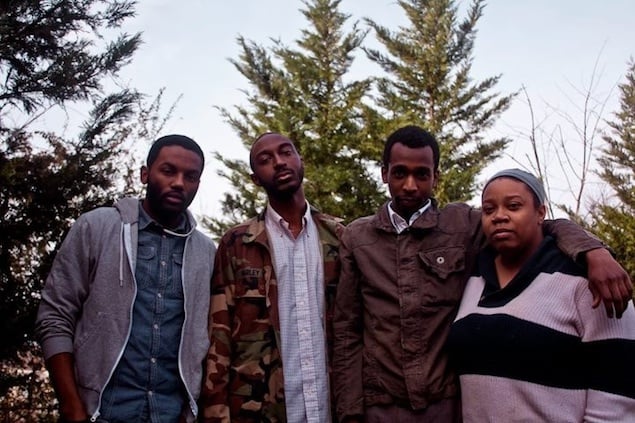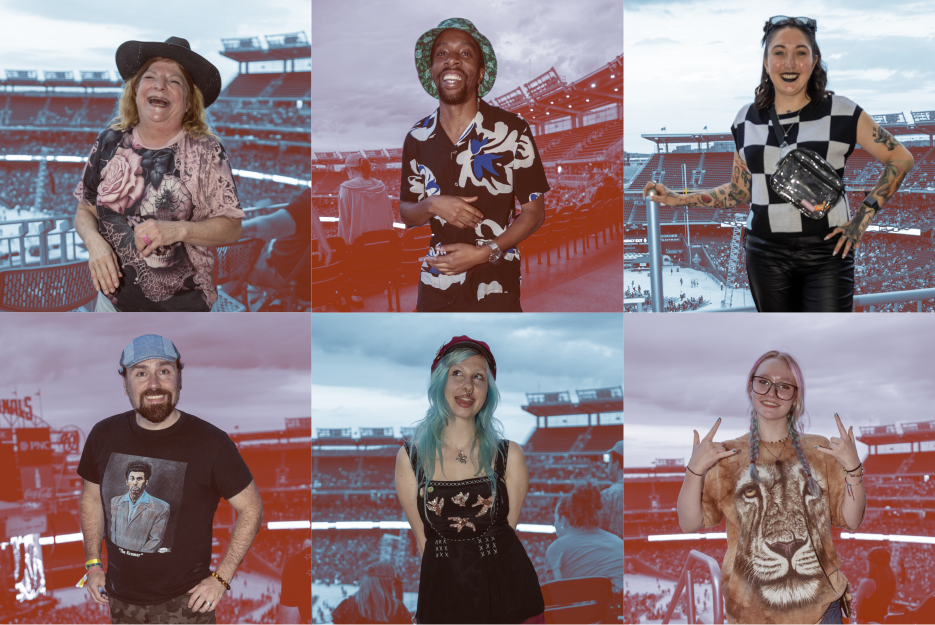Brookland-based electronica/indie four-piece Redline
Graffiti have been around for less than a year, but they’re already
picking
up steam in the blogosphere, a fact they hope to capitalize on
with this Sunday’s* show at Black Cat. The band released their
four-track EP,
About and Because, last December, after two-and-a-half months of meticulous work in the studio, and the result–a fusion of chilled-out beats,
smooth vocals, and introspective lyrics–proves they’ve got staying power. Their next record,
The Drill, drops in June.
The name Redline Graffiti pays homage on the band’s home base in Northeast DC and the recognizable stretch of wall art that
runs parallel to the Brookland train tracks. We sat down with the group’s composer,
Donald Martin, band leader and songwriter
Drew Moten, and guitarist
Ajene “AJ” Harley to discuss their local roots, dream collaborators, and how they create their sound.
How did you meet and come together?
DREW: I’ve known AJ the longest. We’ve been friends for years now. We went to school together [at Howard University]. I met
Donald maybe two years ago, through friends.
DONALD: One of the interesting things that solidified
the whole deal is when I met up with Drew, there was this little
synthesizer
[at his house]. . . . Basically you had this high-pitched
square sound. He was just looking at me like, “What are you doing?”
And I was just playing with it, making it sound like R2D2.
Your music is very cinematic-sounding to me. I don’t know if you’ve heard that before, but my question would be: If you could
do a soundtrack for any filmmaker, who would it be?
DONALD: Trent Reznor did
The Social Network right? That’s funny because I always thought–how did these guys do these soundtracks? I was kind of enamored when Daft Punk
did the soundtrack for
Tron: Legacy. And now you go back to Vince Guaraldi, who did the soundtrack for the
Peanuts stories, the Charlie Brown stories. I don’t know, I really don’t know. I think it depends on the idea.
DREW: Charlie Kaufman.
AJ: I think it’d be tight to do some animated film.
Like Pixar?
AJ: Not necessarily. A little harder than Pixar.
DONALD: If you said Shinichi Watanabe, who did [the anime]
Cowboy Bebop, maybe. They have some great soundtracks.
DREW: Oh. That guy–what’s that guy? He did
Hunger and
Shame.
Steve McQueen?
DREW: Yeah, Steve McQueen, exactly. I’d like to do a soundtrack for him.
What’s the last great show you’ve seen recently?
DREW: It would have to be the Roots Picnic, because I got to see so many acts. It was in Philly but–Eastern seaboard love.
AJ: Last year I had the opportunity to see BB King when he came up. That was probably the most memorable performance to date.
DONALD: The last great show I saw? I have to say, it
was in New York City. In Central Park, Summer Stage . . . Q-Tip, when
he came on, oh my goodness. He was very, very intense, too,
rapping and singing all these hooks, and . . . I was just like,
“Okay!” Not only that, but the musicians he had were killing.
He had DJ Scratch in the setup. It was definitely dope.
Who are your biggest musical influences?
DREW: It’s too hard . . . James Jamerson. The early Sonic Youth. Daydream Nation.
AJ: At this point in time it would probably be Muddy Waters. Thelonious Monk. He’s up there right now.
DONALD: Soulwax, definitely. Stevie Wonder. A lot of
singers quote him, but I definitely credit people who actual musicians
credit. He’s one of those interesting artists who mix
synthesizers with R&B and all this other stuff. I think I’ll stick
with
those right now.
When’s the first time music really grabbed you as a profession?
AJ: It was right after [Hurricane] Katrina, sophomore
year. That summer, I was the first one back home to New Orleans. My
family had been displaced. They needed someone to go check on
the house, though. So I went down there and lived, and it was
crazy ’cause there was nobody there. So, it was funny, my
mother had bought my father a guitar before I was born, and he wanted
to teach himself to play, but he never did. And it was sitting
in the corner there. I just picked it up and taught myself
that summer. So I always say, man, if I don’t have anything
else, I’ve got the music.
DONALD: The first instrument I actually touched was in
pre-kindergarten. I don’t know why I remember this. There was a pair
of bongos on the floor. Everyone was sort of playing around and
stuff, so I figured, okay, hey fine, I’ll try it. People started
dancing, so I stopped. They stopped. I started playing again,
they started dancing again. The teacher looked in like, “Hey,
what’s everyone doing?” That idea of control over what’s
happening, I always kind of liked. It’s kind of sinister, but at
the same time, I’m a kid, getting to play music. So, after
that, I kinda kept going.
DREW: To be honest, I didn’t start to think about it
until I was 22, when I started to play bass. I sort of look up to
musicians
who can’t sing but people tolerate their voices. Because
they’re great. Anthony Kiedis. Or Jimi Hendrix. Scarlett Johansson.
So you’re aspiring to be ScarJo?
DREW: No, but . . . the list does go on and on.
Drew, what is your writing process like? Is there a place you go to get ideas?
DREW: It’s hard to describe. Most of the time I wake up in the middle of the night and write them down.
You have one track called “End of the World.” Speaking of that, how do you think the world will end?
DREW: Pollution, guns, people killing themselves about water.
DONALD: Actually, that’s pretty apt if you ask me. I think that’s what I’m thinking. Lack of trust, too.
DREW: Some very pragmatic means.
AJ: I don’t know. I mean, that’s a philosophical question. Are you talking about the end of existence on the earth or the
end of the earth itself? There’s a lot of stuff you’ve got to take into account.
DONALD: That’s a good point, too.
Do you feel like your band is pretty plugged in to the local music community?
DONALD: So far it’s been good. No one’s throwing eggs at us at any shows, so I think, hey, okay.
So you’re about to play the Black Cat. You’ve played there before, but how do you prepare for a gig like that?
DONALD: Rehearsal, rehearsal, rehearsal.
DREW: There’s no right-before ritual or anything like that.
DONALD: Yeah, no one throws glitter in the air. None of that stuff.
DREW: Certainly no prayer. It’s very relaxed. I think the practicing just helps make everything relatively routine.
AJ: Practice, plus a shot of whiskey.
DONALD: It’s true. Whiskey does help sometimes.
If you could play anywhere, where would you want to play?
DONALD: Bonnaroo.
DREW: I want to play the White House before Obama’s second term is over.
AJ: Anywhere. Everywhere.
Redline Graffiti, with openers Bosco and Laughing Man, play this Sunday*, May 13, at Black Cat. Tickets ($10) are available
through Black Cat’s
website. For more
information, visit the band’s website.
*This post has been updated from a previous version.
















